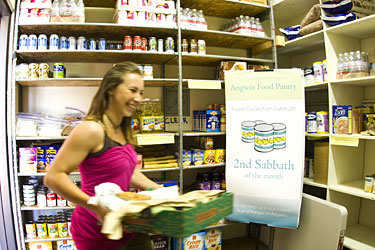Learn More About PUC
Students Apply Theory with the Angwin Food Pantry
By David Ranzolin on May 29, 2009
Share this

A few months ago, senior social work major and president of the Social Work Forum Alisa Jacobo discussed the possibility of starting a weekly food pantry with fellow social work majors and faculty. "I realized we needed to develop some type of sustainable program so that social work majors can learn and serve," she says. "A food pantry was the most practical solution." Professor Monte Butler, the eventual faculty sponsor of the pantry, helped kick-start the project.
The consolidation of the food pantry occurred simultaneously with a food study also conducted by the social work department. The study purposed to discover whether the Angwin community suffered from lack of food. Surveys were administered door-to-door and available in the market, gas station, and laundromat. Almost 600 responses were collected. The conclusion: Yes. Many local families go to bed hungry each week. For Alisa, the study confirmed what she had already suspected and further pushed efforts for the food pantry.
The pantry now assembles every Thursday evening in the PUC church complex from 6 to 9 p.m. Around 25 families attend each week and are able to pick up various food items depending on their need. Bi-lingual volunteers are readily available to overcome any language barriers. The PUC Church donates food on a monthly basis and helps sustain the pantry with financial donations.
For students and social work majors in particular, the food pantry offers the opportunity to apply theory to practice. "In my experience, going through classes based on theory, we learn about grant writing, development and policy but haven't necessarily had the opportunity or an avenue to learn or practice outside of our internships," says Alisa. "The food pantry is a structured place where we can learn and ask questions with our professors." Butler agrees. "It is our job to take students beyond knowing about social work to being able to do social work," he says. "Projects like the Angwin Food Pantry give students the opportunity to serve the community while helping them practice some important skills in running, monitoring, and improving a small social welfare program."
Strong community and student support has amounted to too little work for so many volunteers. "I actually don't have enough stuff to do for the amount of volunteers that are willing to help," quips Alisa. This is not to say volunteers are not welcome or desired. Anyone interested in helping out should visit the social work department and talk with Margaret Roy or Butler. Butler expects food insecurity will be a problem in the foreseeable future and plans to keep the pantry open as long as it is meeting a need.
Latest News
Winter Student Week of Worship: Destined to Experience God
By Marina Maher on February 20, 2026
16 Schools Compete in Pioneers Invitational Academy Basketball Tournament
By Ally Romanes on February 5, 2026
Jordan Delarmente: Christ-Centered Service in the Military
By Marina Maher on January 29, 2026
Charlie: The Aviation Program’s New Vessel for Service and Mission
By Marina Maher on January 26, 2026
